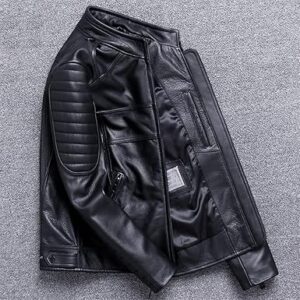Sustainable fashion is all about making choices that are kind to both the planet and the people who make our clothes. When it comes to jackets, choosing natural materials can significantly reduce environmental impact while offering style and comfort. Here are the top 10 Natural Jackets materials that embody sustainability:

- Organic Cotton
- Description: Grown without synthetic pesticides and fertilizers, organic cotton is a sustainable alternative to conventional cotton. It’s breathable, soft, and perfect for lightweight jackets.
- Benefits: Reduced water usage, minimal chemical exposure, and better soil health.
- Ideal For: Casual jackets, windbreakers, and denim-style jackets.
- Linen
- Description: Made from the flax plant, linen is one of the oldest natural fibers. It’s strong, lightweight, and gets softer with each wash.
- Benefits: Low water and pesticide usage, biodegradable, and highly durable.
- Ideal For: Summer jackets, blazers, and light trench coats.
- Hemp
- Description: Hemp is a fast-growing plant that requires minimal water and no pesticides. It produces a fabric that is similar to linen but with more durability.
- Benefits: Regenerative agriculture, low environmental impact, and naturally resistant to mold and UV light.
- Ideal For: Outdoor jackets, casual wear, and rugged jackets.
- Wool
- Description: Sourced from sheep, wool is a natural, renewable, and biodegradable material. It’s excellent for insulation, making it perfect for colder climates.
- Benefits: Breathable, moisture-wicking, and naturally flame-resistant.
- Ideal For: Winter coats, blazers, and outdoor jackets.
- Alpaca Wool
- Description: Similar to sheep’s wool, alpaca wool is softer, lighter, and warmer. It’s sourced from alpacas, primarily in South America.
- Benefits: Hypoallergenic, biodegradable, and sustainably farmed.
- Ideal For: High-end coats, cardigans, and luxury jackets.
- Tencel (Lyocell)
- Description: Tencel is made from sustainably sourced wood pulp, usually eucalyptus, beech, or spruce trees. It’s soft, breathable, and strong.
- Benefits: Closed-loop production process, biodegradable, and uses less water than cotton.
- Ideal For: Lightweight jackets, casual wear, and windbreakers.
- Recycled Wool
- Description: Recycled wool is made from pre-consumer and post-consumer wool waste, making it an eco-friendly alternative to virgin wool.
- Benefits: Reduces waste, conserves resources, and retains the qualities of new wool.
- Ideal For: Winter coats, blazers, and knitted jackets.

- Silk
- Description: Silk is a luxurious, natural fiber produced by silkworms. It’s lightweight, strong, and has a beautiful sheen.
- Benefits: Biodegradable, natural temperature regulator, and requires minimal chemicals when produced organically.
- Ideal For: Lightweight jackets, bombers, and luxury outerwear.
- Bamboo
- Description: Bamboo fabric is derived from the pulp of bamboo plants. It’s incredibly soft, lightweight, and breathable.
- Benefits: Fast-growing plant, requires no pesticides, and is biodegradable.
- Ideal For: Lightweight jackets, raincoats, and casual wear.
- Cork
- Description: Cork fabric is made from the bark of cork oak trees. It’s a unique, sustainable material that is durable, water-resistant, and naturally insulating.
- Benefits: Harvesting cork does not harm the tree, it’s renewable, and biodegradable.
- Ideal For: Outerwear, particularly raincoats and vegan leather jackets.
Conclusion
Choosing natural jacket materials is a significant step towards embracing sustainable fashion. Not only do these materials reduce the environmental impact of your wardrobe, but they also offer a variety of textures, weights, and styles to suit any fashion preference. Whether you’re looking for something lightweight and breathable or warm and durable, there’s a sustainable natural material perfect for your next jacket.
